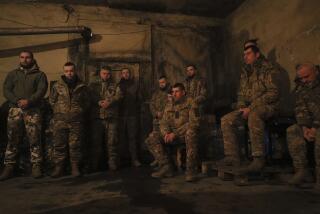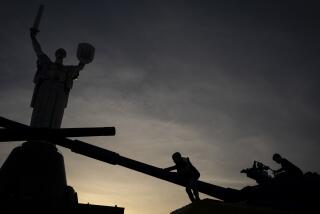Mubarak’s ‘Paper Tiger’ Label for Iraq Appears Right : Tactics: Initial reports from the front indicate that Hussein’s land forces are no better than his air defenses.
- Share via
As with the first days of the air war last month, “So far, so good,” is the assessment in the opening hours of the ground war to dislodge Saddam Hussein’s forces from Kuwait.
And, if the optimists are indeed correct, the war may be over before most people realize there has been one. Despite the wild propaganda claims from Baghdad Radio that the allied forces have suffered a terrible defeat and are drowning in their own blood, there is really no doubt who will have won.
There is a sense of deja vu about the initial reports. They sound much like the initial reports of the first hours of the air campaign. After much speculation about how formidable the Iraqi air defenses were, about how many MIG interceptors, Mirage fighters, SAM (surface to air) missiles and AAA (antiaircraft artillery) guns and cannons they could bring to bear, exactly one allied plane was lost during the first day of the air campaign.
Before the land campaign began, there was report after report of how formidable the Iraqi fortifications were. They were so well-protected by mines, so well-entrenched, so well-guarded that they were virtually impregnable. Allied losses would be fearsome, on the order of British losses on the first day of the Battle of the Somme in July, 1916, when more than 50,000 soldiers fell in the first half hour.
Egyptian President Hosni Mubarak tried to tell us that the Iraqi military was a paper tiger, more fierce in appearance than in performance. He told us they would collapse under allied attack. But, in the media at least, his words fell on deaf ears. Believing that it was dangerous to underestimate the enemy, I was among those who urged caution.
From the initial reports, it appears that Mubarak was right. Less than a full day after the invasion, allied forces are deep within Kuwait and western Iraq on at least three fronts, and the allies have suffered very few casualties in the early action. No word of the mines, booby-traps, field fortifications, trenches and the like that were supposed to have stopped such an attack, or at least delayed it until the superior Iraqi artillery could do its awful work.
Instead there are reports of more than 10,000 enemy prisoners of war, of thousands more Iraqis ahead of the allied columns raising white flags. French forces say they have taken more than 1,000 enemy prisoners during the course of their advance.
And the ground attack put the lie to one of the most scurrilous notions of the campaign--that the allied coalition would collapse under the slightest pressure and that, in any case, when it came down to it, the allied forces, and the Arab forces in particular, would not fight.
Such criticism, on the face of it, did not seem to make much sense. The Arab nations--Egypt, Syria, Saudi Arabia, Morocco, the United Arab Emirates, Qatar and Bahrain--literally had staked their future on the coalition, and the smaller nations of the Gulf their very survival.
Yet speculation was that, when faced with Hussein’s call for a jihad, or holy war, when faced with the possibility that Israel, under the extreme provocation of Iraqi Scud attacks, would retaliate; or when faced with the Soviet peace proposal, the Arab coalition would come apart. Why they would yield the field to Hussein for such flimsy reasons and jeopardize their own futures was never explained. Events, however, have proved that the “weak reed” of the Arab coalition instead was a quite sturdy oak.
The same can be said for the fighting abilities of their armed forces. From the start of the air campaign, the Arab forces have fought well. The Saudi air force is second only to the U.S. in air sorties flown, and Qatar and Bahrain also have flown combat sorties over Kuwait and Iraq.
Initial reports of the ground campaign tell of Kuwaiti and Saudi ground forces leading the attack along the eastern coastal road toward Kuwait city, and speculation is that these forces will be the ones to liberate the Kuwaiti capital. Other reports tell of Egyptian and Syrian armored forces moving through the desert on the western flank in a turning movement to cut off the Iraqi lines of retreat. All indications are that these Arab forces, as they did at the skirmish at Khafji, will fight and fight well. Where the ridiculous notion came from that Arabs would not fight Arabs, even though they have done so for centuries, is one of the minor mysteries of this crisis.
As the allied ground campaign continues, the Iraqi military faces some terrible choices. From my own experiences during the Korean War, when North Korean and Chinese forces would infiltrate far into the rear and cut our lines of supply and communication, I know how frightening it is to be faced with enemy fire to your front, while at the same time hear firing far to your rear. The first impulse is to panic and retreat while there is still time.
The saving grace in Korea was that we knew that such encirclement was only temporary, because the enemy lacked the strength to hold out under the counterattacks that were sure to come.
But the allied encircling forces in Kuwait and Iraq not only have the strength to hold, they are reinforced by allied air power that has the capability to destroy any Iraqi force that leaves the protection of its defensive positions.
The great fear for the allied ground campaign was that it would get hung up in its attempts to breach the Iraqi forward defenses. If that happened, the allies could get bogged down in World War I-type trench warfare and take enormous casualties. That would play directly into Hussein’s hands, and it could have weakened American support for the war.
But that didn’t happen. Those fortifications are now well in the allied rear. Instead of the allies fighting Hussein’s war of static defenses and attrition, Hussein is now being forced to fight the allied warfare of swift movement and maneuver. Though there are still many challenges ahead before the war can be brought to an end, so far the allied campaign is progressing according to plan.
More to Read
Sign up for Essential California
The most important California stories and recommendations in your inbox every morning.
You may occasionally receive promotional content from the Los Angeles Times.










